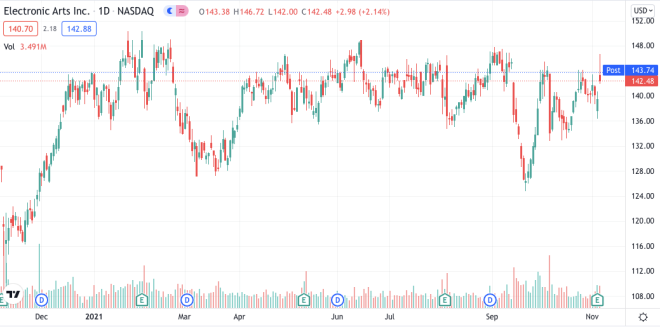The Future Of Gaming
On the earnings call, Wilson added that “it’s still early to figure out how that’s going to work.” Given EA’s long-time licensing partners, most notably with heavy-hitting sports league IP, there’s clear-cut potential moving forward in integrating NFTs into gaming. How the ecosystem at large operates is a much muddier perspective.
Electronic Arts' (EA) stock has had a nonchalant 2021 thus far after a great close to last year. | Source:
Related Reading | Quant Explains How Bitcoin On-Chain Data Can Identify Peaks Vs. Shakeouts
The Current Landscape
Traditional gaming publishers to date have moved with caution around blockchain integration. Ubisoft is one of the first top-tier developers to actually make a move, supporting funding to . Another major developer, Valve, has having no interest in blockchain or NFT engagement at present time. Competitor Epic Games, on the other hand, from CEO Tim Sweeney around the same time as Valve’s statement, noting that Epic would “welcome games that make use of blockchain tech.” As is the case with many mainstream blockchain integration, being a first-mover likely brings a high-risk, high-reward factor that leave established players more hesitant. Play-to-earn games have made a splash this year in the crypto-sphere, highlighted by the enormous success of Axie Infinity. Now, with the growth of gaming and crypto, traditional publishers are likely feeling the heat to be ‘future-proofed’. Titles like Fortnite and CS:GO, along with the aforementioned FIFA, are often mentioned when it comes to NFTs, as in-game skins and collectibles that can be transferrable from one developer’s title to another are often cited as the most common idea for NFT integration in gaming.
Axie Infinity has reshaped how we traditionally view video games. | Source: AxieInfinity.com
Related Reading | DFINITY Foundation Partners United Esports To Launch Internet Computer Gaming Program
Featured image from Pexels, Charts from TradingView.com












